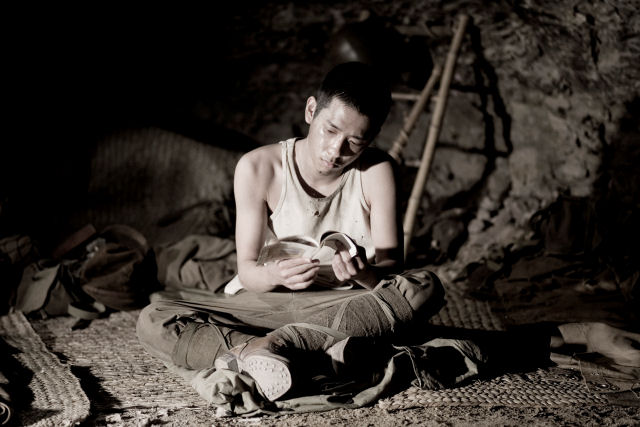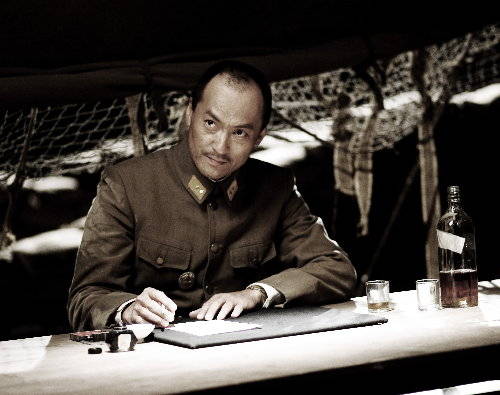 While I thought most critics lavished too much praise on Pan’s Labyrinth, the very similar swells of appreciation for Clint Eastwood’s Letters from Iwo Jima are, surprisingly, much closer to the mark. Eastwood’s first crack at Iwo Jima in 2006, Flags of our Fathers, was to my mind a well-meaning dog, one made particularly lousy by the heavy-handed fingerprints of Paul Haggis all over the film. But (perhaps due to the different screenwriter, Iris Yamashita), Letters is really something quite remarkable. A mournful, occasionally shocking testament to the inhumanity and absurdities attending war, and a elegiac dirge for those caught in its grip, even on the other side of the conflict, Letters from Iwo Jima is an impressive — even at times breathtaking — siege movie. And strangely enough, elements that seemed trite or intrusive in Flags — the desaturated landscape, the minimalist piano score — are truly haunting and evocative here. In fact, Letters from Iwo Jima is so good it even makes Flags of our Fathers seem like a better movie just by association, which, trust me, is no small feat.
While I thought most critics lavished too much praise on Pan’s Labyrinth, the very similar swells of appreciation for Clint Eastwood’s Letters from Iwo Jima are, surprisingly, much closer to the mark. Eastwood’s first crack at Iwo Jima in 2006, Flags of our Fathers, was to my mind a well-meaning dog, one made particularly lousy by the heavy-handed fingerprints of Paul Haggis all over the film. But (perhaps due to the different screenwriter, Iris Yamashita), Letters is really something quite remarkable. A mournful, occasionally shocking testament to the inhumanity and absurdities attending war, and a elegiac dirge for those caught in its grip, even on the other side of the conflict, Letters from Iwo Jima is an impressive — even at times breathtaking — siege movie. And strangely enough, elements that seemed trite or intrusive in Flags — the desaturated landscape, the minimalist piano score — are truly haunting and evocative here. In fact, Letters from Iwo Jima is so good it even makes Flags of our Fathers seem like a better movie just by association, which, trust me, is no small feat.
 As you probably know by now, Letters from Iwo Jima follows the famous World War II battle, ostensibly depicted in Flags, from the Japanese side. Here, nobody cares about artfully raised flags or the Ballad of Ira Hayes — the emphasis instead is on honor and survival. General Tadamichi Kuribayashi (Ken Watanabe, as captivating here as he was in The Last Samurai) has been ordered to lead the defense of the island against the Americans. To this task, he fully devotes himself, despite fond memories of his earlier days on US soil. But it only takes a few walks around Mt. Suribachi for Kuribayashi to figure out it’s pretty much a no-win scenario — the Americans are too many, too productive, and too strong. And once word leaks out that the Japanese fleet has been broken at Leyte Gulf, Kuribayashi and his men — most notably friendly grunt Saigo (Kazunari Ninomiya), and former Kempetai Shimizu (Ryo Kase) — must slowly come to grips with the fact that they’re not digging cavern defenses so much as their own tomb…a tomb in which many Japanese officers, and not least the headquarters on the homeland, will expect them to die with honor.
As you probably know by now, Letters from Iwo Jima follows the famous World War II battle, ostensibly depicted in Flags, from the Japanese side. Here, nobody cares about artfully raised flags or the Ballad of Ira Hayes — the emphasis instead is on honor and survival. General Tadamichi Kuribayashi (Ken Watanabe, as captivating here as he was in The Last Samurai) has been ordered to lead the defense of the island against the Americans. To this task, he fully devotes himself, despite fond memories of his earlier days on US soil. But it only takes a few walks around Mt. Suribachi for Kuribayashi to figure out it’s pretty much a no-win scenario — the Americans are too many, too productive, and too strong. And once word leaks out that the Japanese fleet has been broken at Leyte Gulf, Kuribayashi and his men — most notably friendly grunt Saigo (Kazunari Ninomiya), and former Kempetai Shimizu (Ryo Kase) — must slowly come to grips with the fact that they’re not digging cavern defenses so much as their own tomb…a tomb in which many Japanese officers, and not least the headquarters on the homeland, will expect them to die with honor.
 What’s particularly surprising here is how unafraid Eastwood is to invert the usual sympathies of a World War II film. It’s not just that the Japanese are the “good guys” here — True, Letters dramatizes the soldiers’ plight by portraying them, particularly Saigo, as just like our fun-loving GI’s at heart. But it also doesn’t shy away from examining a cultural emphasis on dying well that seems completely foreign to the American mind. And, although a wounded American serviceman shows up later in the film, for the most part the US forces are — surprisingly — portrayed here like something out of The Empire Strikes Back, all gleaming, remorseless battleships and Fiery Death from Above. (Some have argued that Eastwood elides over Japanese atrocities in this film, but I’m not sure that’s really fair, unless I somehow just missed the Dresden firebombing subplot in Saving Private Ryan. This is not to say that all war crimes are equivalent or that both sides are equally guilty (although Lord knows it got ugly) — that gets into a moral calculus well outside the bounds of this review — only that Letters seems more interested in portraying war itself as an atrocity, and that enough reference is made to ugly tactics (aiming at medics, for example) that the film doesn’t feel to me like a whitewash.)
What’s particularly surprising here is how unafraid Eastwood is to invert the usual sympathies of a World War II film. It’s not just that the Japanese are the “good guys” here — True, Letters dramatizes the soldiers’ plight by portraying them, particularly Saigo, as just like our fun-loving GI’s at heart. But it also doesn’t shy away from examining a cultural emphasis on dying well that seems completely foreign to the American mind. And, although a wounded American serviceman shows up later in the film, for the most part the US forces are — surprisingly — portrayed here like something out of The Empire Strikes Back, all gleaming, remorseless battleships and Fiery Death from Above. (Some have argued that Eastwood elides over Japanese atrocities in this film, but I’m not sure that’s really fair, unless I somehow just missed the Dresden firebombing subplot in Saving Private Ryan. This is not to say that all war crimes are equivalent or that both sides are equally guilty (although Lord knows it got ugly) — that gets into a moral calculus well outside the bounds of this review — only that Letters seems more interested in portraying war itself as an atrocity, and that enough reference is made to ugly tactics (aiming at medics, for example) that the film doesn’t feel to me like a whitewash.)
The sobering truth at the heart of the grim, moving Letters from Iwo Jima is captured in its penultimate image. (Alas, like too many WWII films, Eastwood opts for an unnecessary contemporary bookend, but it’s not as distracting as the Greatest Generation stuff in Flags. In fact, you might argue that it plays very well off those scenes, in depicting what little survives the war on the Japanese side.) I won’t give it away here…suffice to say that Letters makes clear that War is a demon that rips lives apart and rends men asunder, no matter what side you’re on or for what reasons. Regardless of race, creed, nationality, or ideology, all who invoke its wrath will eventually come to taste tragedy.
